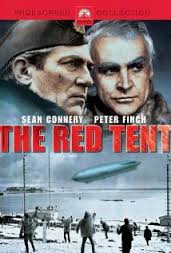
THE RED TENT
Russia/Italy, 1970, 119 minutes, Colour.
Peter Finch, Sean Connery, Claudia Cardinale. Hardy Kruger, Massimo Girotti.
Directed by Mikhail Kalatozov.
The Red Tent is a long epic about the ill-fated expedition of General Umberto Nobile to the North Pole in a balloon. The film is interesting and the photography well done, but somehow or other the film is not as alive as it ought to be. Perhaps the film is rather solemnly handled which makes it somewhat dull. Again, the structure of the film is unusual, in the form of flashbacks which start in the imagination of the aged Nobile and visualise the torments of his conscience - what he should have done in the rescue crises of the past. Those associated with the expedition come to accuse him. These include Raoul Amundsen, the explorer of the Arctic and Antarctica, who lost his life searching for Nobile. The technique is not handled convincingly. A straightforward narrative without the contrived examination of conscience might have made the film more effective and made the same points.
Peter Finch is a dignified Nobile and Sean Connery a quiet Amundsen. The film is a co-operative venture between Italy and Russia.
1. Did the hero and theme of this film seem important? What relevance did they have for our world?
2. Why do people want to explore unknown regions? What achievement is there in this? Are they heroic? Courageous? Reckless? Foolhardy? Gambling with lives?
3. Why was the Arctic a challenge for so many explorers? Were their discoveries and achievements worth the risks?
4. The structure of this film - the flashback technique incorporated into the trial technique? Did it work? Why? Would the film have been better had it been a straight semi-documentary?
5. Did the trial seem serious or ludicrous? (Critics are divided in opinion.)
6. Why did Nobile have a guilty conscience? What did he have to reproach himself with? Do you think he was to blame at all? Did the film take sides for or against him? What evidence from the film?
7. What kind of man was Nobile in the film? Did you admire him?
8. What did he hope to achieve in his flight to the pole? Glory? Reputation and memory? Fulfilment of a courageous enterprise? Knowledge for the world?
9. How did Nobile relate to the members of his crew? Did he conduct the voyage properly? Did he make the proper decisions to return?
10. How did Nobile relate to the survivors? Did he keep control of the group? Did he inspire them with confidence and courage? What else could he have done? Were you pleased with their achievement with the radio contact? Why did the two decide they should walk to safety? Was this a lack of confidence in Nobile? Why did the Doctor go? was this a good decision?
11. What kind of man was the Doctor? Was he a good man? Why was he so dedicated to exploration? How did Valeria change his personality? Did he die well? What did the Italians' baptising him signify?
12. Was Valeria important to the plot? Did she love the Doctor? was she entitled to bargain with the pilot to save the Doctor? Why did she take such steps to enlist Amundsen's help? Was she entitled to hate Nobile as much as she did?
13. What contribution did the pilot make to the story? What kind of man was he? Heroic? Why was he fascinated by Valeria's love for the Doctor? Should he have forced Nobile to return first? Was he to blame for Nobile's disgrace?
14. Were the Italians, government and officers on the spot, to blame for the delays in rescue operations? Must orders be so strictly obeyed?
15. Why did Amundsen decide to search for Nobile? What was his philosophy of exploration in the Arctic? What comment did the sequence of his death make on this?
16. How skilful were the Russians in finding the survivors?
17. Was the Russian pilot justified in taking the risks he did?
18. The participants in the trial judged Nobile guilty. Do you think their verdicts followed from what they had said and done?
19. Why did Nobile agree to leave first? Could he have done anything else? How important was the fact that he would soon have a hot bath? Though he thought of it with pleasure, did it affect his judgement and decisions? Therefore, was his disgrace merited?
20. What comment does the film make on the necessity of making decisions and following them through and accepting consequences? What comment does the film make on heroism?
21. What was the effect, after learning about Nobile, of the final sequences of the grandeur of the Arctic snow? Did this imply that the expedition was worth the difficulties?